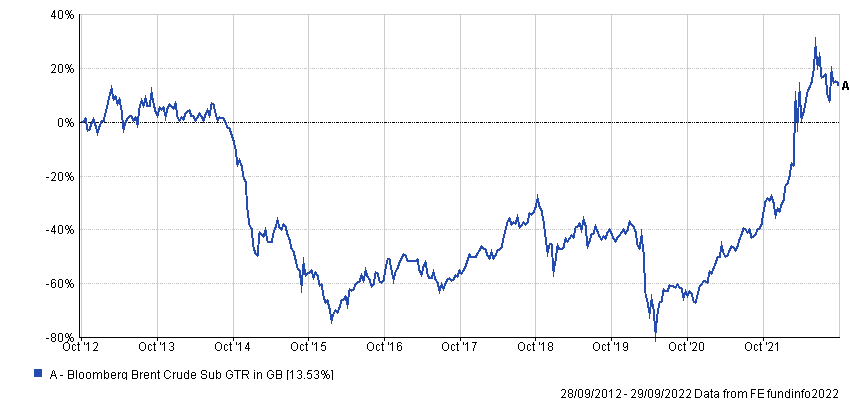It would be wrong to blame high oil & gas prices on the rise of environmental, social and governance (ESG) investing, according to Tom Nelson of the Ninety One Global Natural Resources fund, who said the lack of capital expenditure in this area is a sign that management teams have learned their lessons from the most recent commodities super cycle.
In a Trustnet article published in July, Alec Cutler, the manager of the Orbis Global Balanced fund, pointed out that ESG investors were putting pressure on oil & gas companies to ramp down production, under the threat of divestment.
He said this was preventing them from increasing supply to meet rising demand, which is how high oil & gas prices have been brought under control in the past.
However, while Nelson agreed that a lack of investment is behind elevated energy prices over the past year, he denied that ESG considerations were to blame.
“The spike in oil & gas prices is driven by a whole number of esoteric factors,” he explained.
“But fundamentally it's driven by the fact that oil & gas companies do not have the visibility and the confidence in pricing over five to 10 years to commit capital to projects which are long-dated in nature and really expensive.”
He described the commodity price crash of 2011 to 2016 as a “near-death experience” for miners Anglo American and Glencore. Meanwhile, he pointed out that while Shell's acquisition of BG Group in 2015 now looks visionary, it caused its debt to reach $70bn at a time when the oil price was tumbling “and people were terrified”.
Performance of oil price over 10yrs

Source: FE Analytics
“My point is that the memory of that financial duress from the last down cycle is still raw,” he continued.
“In a lot of cases, management teams across these big resources companies have changed their capital discipline to a focus on value over volume, and are adamant they won’t make the mistakes they made in the last cycle. But we continue to test that.”
There is one aspect of the relationship between ESG and oil & gas that does concern Nelson. Ninety One Global Natural Resources invests in companies that will benefit from or enable the energy transition, while avoiding those that may be structurally challenged by it.
For example, of the big five oil & gas producers – BP, Shell, ExxonMobil, Total and Chevron – Nelson said Chevron is the least prepared for the energy transition, and hence the only one he doesn’t hold in his portfolio. Yet while a post-hydrocarbon plan is a prerequisite for an oil & gas company’s inclusion in his fund, he said only time will tell if they can make the economics of renewable energy work.
“I'm really not worried that BP and Shell are suddenly going to renege on all their commitments, that they're going to go headlong into oil & gas developments,” he continued.
“What's uppermost on my list of worries is, can they generate sustainable and attractive returns in their low-carbon businesses? There's a different but very real risk this time around: the exuberance to get after low-carbon opportunities – which is unequivocally the right thing for them to do – but then they overpay or just get it wrong.”
Nelson said this is one of two reasons why oil & gas stocks may never re-rate from their current low multiples – the other relates to divestment. He is hopeful that sustainable investors realise that they can’t prevent climate change by simply ignoring the five industries that generate 80 to 90% of emissions, and that oil & gas companies could attract more ESG money as their role in providing a solution to the energy transition becomes apparent. He admitted that the sector will never make it off some exclusion lists, though.
“But in a sense, that's the market mispricing and that's the opportunity for those that can find these businesses moving towards more low-carbon energy,” he added. “And you can buy them on 4x earnings, and today's cashflows are between 10 and 15%, so that's a pretty attractive starting point.”




